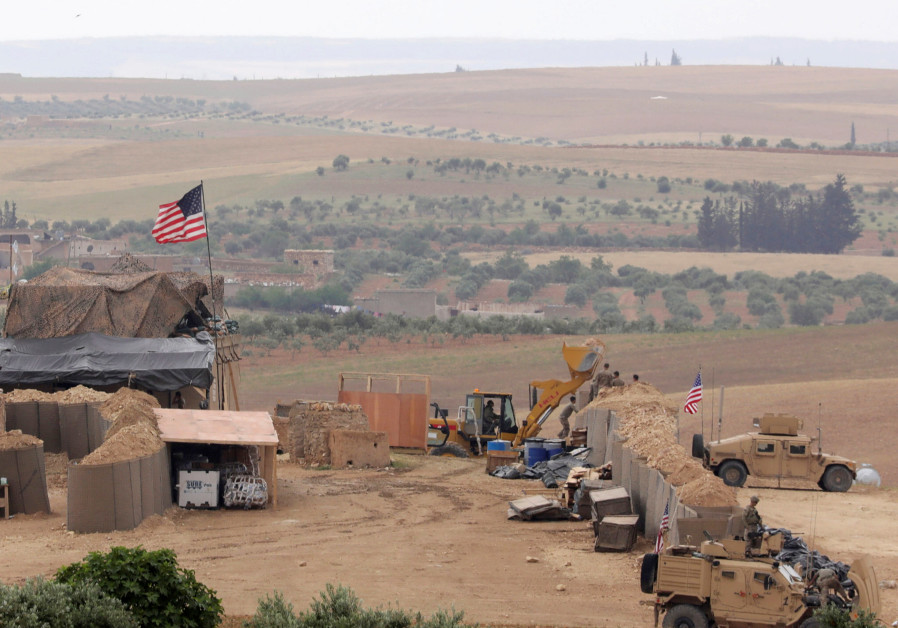Turkey delays Syria agreement with U.S. after Saudi journalist disappears

U.S. forces set up a new base in Manbij, Syria May 8, 2018. Picture Taken May 8, 2018. (photo credit: RODI SAID / REUTERS)
As Turkey continues its investigation into a vanished Saudi journalist, Turkish President Recep Tayyip Erdogan said a deal with the US in northern Syria had been postponed. Speaking on Thursday the president, returning from a trip to Hungary, said the agreement with Washington over the Syrian town of Manbij was delayed “but not dead.”
Manbij is one of a series of interlinked entanglements with the US, Syria and Saudi Arabia. On October 2, Saudi journalist and former Riyadh insider Jamal Khashoggi went missing in Istanbul after visiting the Saudi consulate. Turkey has released video and information alleging that Riyadh was responsible for disappearing him or even killing him. This has reverberated far away in Washington, where the Trump administration has been frantically calling Saudi Crown Prince Mohammed Bin Salman, seeking answers. At the same time Vice President Mike Pence has offered FBI assistance to Ankara.
But Ankara has cold relations with Washington over the detention of a US pastor and because Turkey has alleged the US is working with “terrorists” in Syria. The US-led anti-ISIS coalition has been partnered with mostly Kurdish fighters from the Syrian Democratic Forces (SDF) in eastern Syria. However, some of those fighters are affiliated with the People’s Protection Units, which Turkey sees as part of the part of the Kurdistan Workers’ Party. From Ankara’s view, the US, a NATO ally, is thus working with Turkey’s enemies. But the US has said that it wants to remain in eastern Syria until Iran leaves the rest of Syria, and Washington sees the SDF as a key partner.
At the center of the controversy is the northern town of Manbij, which is controlled by the SDF and where the US has forces. Since June, the US and Turkey have agreed to carry out patrols near the town. They were also training for joint patrols. This was part of a “road map” that US Secretary of State Mike Pompeo had agreed to with Ankara.
On October 2, US personnel arrived in Gaziantep to begin training with Turkey for joint patrols in Manbij. This happened to be the same day the Khashoggi crisis began. On October 3, Erdogan’s spokesman Ibrahim Kalin said that the Manbij roadmap should be implemented as soon as possible.
“Turkey can take steps at any time to ensure its national security against terror groups in Syria,” Kalin was quoted in Hurriyet Daily News as saying. Turkey’s defense minister said on October 9 that the training was taking place with the US.
Now the deal is postponed. This may be a method for Turkey to pressure the US to do more on the Khashoggi affair. Turkey wants the journalist found alive, and they hope that the US will pressure Riyadh. Turkey and Riyadh have contentious relations after Turkey sided with Qatar in a dispute with Saudi Arabia in 2017.
Furthermore, leaders in Saudi Arabia have condemned Turkey as part of a “triangle of evil” alongside Qatar and other extremists. This is because Riyadh accuses Ankara of siding with the Muslim Brotherhood in other countries, including with Hamas in Gaza and with the Muslim Brotherhood in Egypt. Saudi Arabia supports the current Egyptian government and has opposed the Brotherhood.
Turkey sees the Khashoggi affair as a way to leverage Washington back to its camp. There are many voices in the US, increasingly in Congress and major media, that are critical of Saudi Arabia’s current policies. Ankara hopes that the US might be encouraged to now see things from Ankara’s view in Syria and elsewhere. The Manbij postponement may relate to that. It also relates to continued US pressure for Turkey to release detained pastor Andrew Brunson.
What is at stake here is a larger regional struggle. The US is close to Riyadh and Jerusalem and the Trump administration has sought even warmer ties with Israel and the Saudis. Turkey withdrew its ambassador after the US moved its embassy to Jerusalem, and Turkey has been meeting with Iran and Russia regarding Syria. It signed an agreement with Russia over Syria’s Idlib province.
All of this points to the US being sidelined and even isolated. But Turkey and Qatar are traditional US allies, and the division between them on the one hand and Saudi Arabia, UAE and Egypt on the other have divided the Sunni states in the region as Iran seeks greater influence in Syria, Iraq, Lebanon and Yemen. What happens in Manbij, with the pastor Brunson and with the Khashoggi affair are all tied to this current regional strategic map.
Join Jerusalem Post Premium Plus now for just $5 and upgrade your experience with an ads-free website and exclusive content. Click here>>






Comments are closed.